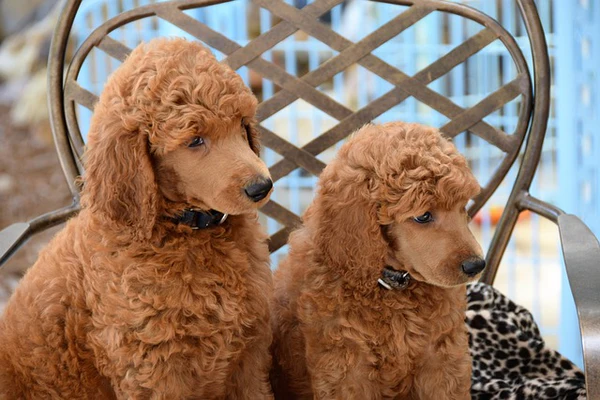Apricot Color Dog

Apricot Color Dog:- The apricot Poodle is an eye-catching, unique variation of the Poodle breed, known for its distinctive coat color. With fur resembling the soft hue of a peach’s interior and a classic black nose, these Poodles are highly sought-after due to their rare color. The apricot shade may fade or deepen over time, but ideally, the color remains consistent throughout, with no lighter roots.
Are Apricot Poodles Rare?
Yes, Apricot Color Dog are exceptionally rare! This color comes from a recessive gene, meaning that both parents must carry and pass on the gene for a puppy to be born with this apricot hue. Most Poodles are commonly seen in black or white, and while other shades like red, cream, blue, and brown are allowed by the breed standard, apricot stands out as one of the least common.

The rarity of Apricot Color Dog makes them highly desirable, which can also increase their price. Some prospective owners may find themselves on long waitlists, sometimes waiting months or even years for the perfect apricot puppy. It’s essential to be patient and prepared for the wait if you’re set on welcoming one of these beautiful dogs into your home.
Health and Care of Apricot Poodles
The care requirements for an Apricot Color Dog are the same as for any Poodle, regardless of color. Their temperament, behavior, and health are not influenced by their coat’s shade. However, like all Poodles, apricot Poodles are prone to gastrointestinal issues, so it’s crucial to feed them high-quality dog food and monitor any signs of digestive distress. If your dog experiences vomiting or diarrhea, it’s always a good idea to consult your veterinarian.
Additionally, Poodles are known for their high intelligence and energy levels. Daily exercise and mental stimulation are essential to prevent boredom. If an apricot Poodle doesn’t receive enough activity, they can develop undesirable behaviors like excessive barking, chewing, or becoming reactive. Whether it’s a brisk walk, interactive playtime, or obedience training, keeping your Poodle engaged is vital for their overall well-being.
Top 4 Unique Facts About Apricot Poodles
1. Poodle Color Confusion is Common
Even experienced breeders can occasionally mix up Poodle colors. While apricot is a recognized and popular shade, it can easily be mistaken for other hues. Apricot Poodles can sometimes be confused with red or deep cream-colored Poodles, and the subtle distinctions might only be noticeable to a trained eye. For instance, true apricot Poodles often exhibit a bright, sunny, diluted brown tone, but many also display slightly darker feathering on their ears, adding to the confusion.

2. Their Coats Can Fade Over Time
One of the more interesting quirks of apricot Poodles is that their coats can change color as they mature. It’s not uncommon for a tan or light brown Poodle to fade into a more apricot-like shade as they age. In some cases, it may take until the dog is a year or two old for the apricot hue to fully emerge. Even after that, some apricot Poodles will continue to lighten over time, especially around the age of 2-3 years when a second phase of coat fading can occur.
3. They Are the Rarest Poodle Color
Apricot Poodles are not only striking but also exceptionally rare. The American Kennel Club recognizes several Poodle colors, including blue, black, brown, gray, café au lait, and apricot. Apricot Poodles, however, stand out as the rarest due to the recessive gene responsible for this unique coloration. What makes apricot even more fascinating is that it’s one of the most recent color variations to develop within the breed, further adding to their rarity and allure.
4. The First Apricot Poodle Was Misidentified
Sowden Yellow Gall, the first recorded apricot Poodle, was initially thought to be a liver-colored dog. Born to liver-brown and white parents, the assumption was logical. However, as the puppy grew, its owner realized that its color wasn’t typical of liver but rather a unique shade that eventually became known as apricot.

The Science Behind the Color
The apricot color is the result of a recessive gene that dilutes the brown pigment in a Poodle’s coat. This genetic combination is quite rare, making it difficult for breeders to consistently produce apricot-colored puppies. The intensity of the apricot shade can range from a pale, creamy tone to a deep, rich apricot. Interestingly, exposure to sunlight can further enhance the apricot color, making outdoor activities all the more dazzling.
Grooming Needs of an Apricot Poodle
Like all Poodles, apricot Poodles boast a luxurious, curly coat that requires regular grooming to maintain its beauty and prevent matting. Daily brushing is highly recommended to keep their fur free of tangles, dirt, and debris, and it also helps strengthen the bond between you and your dog.
Bathing your apricot Poodle every 4-6 weeks will keep their coat fresh and clean. It’s essential to use a gentle dog shampoo to avoid stripping their fur of its natural oils. For a polished look, you might opt for professional grooming services. Whether you prefer a classic show cut or a cute teddy bear trim, regular grooming is key to maintaining the elegance of your apricot Poodle.
Conclusion
Apricot Poodles are truly one-of-a-kind, not just for their striking color but also for their intelligence, loyalty, and charm. While their coat may change and fade over time, the love and affection they offer will never wane. If you’re willing to be patient and invest in their grooming and care, an apricot Poodle will undoubtedly be a cherished companion for years to come.
Also Read:-




